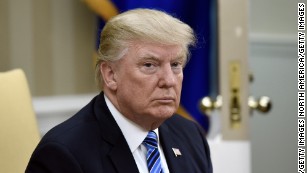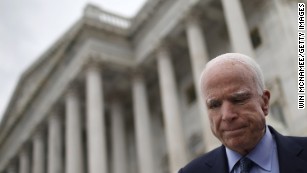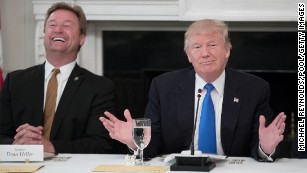According to an association memo from July 6, all the leaders that answered the poll voted to keep existing policy. But, the memo continues, as far as members go, they are "free to comment about political figures as individuals."
That means if individual experts want to share their thoughts about the President's behavior, for example, they are free to do so as "APsaA does not consider political commentary by its individual members an ethical matter. APsaA's ethical code concerns clinical practice, not public commentary," the memo states.
The other group, the 37,000-member American Psychiatric Association, has a different ethics policy.
"It is unethical for a psychiatrist to offer a professional opinion unless he or she has conducted an examination and has been granted proper authorization for such a statement," according to its code of ethics. In fact, the APA's ethics committee met this winter and it expanded its existing policy, known as the "Goldwater Rule," to be even more restrictive. In the past, the Goldwater Rule was interpreted by many to apply only to official diagnosis.
Under new guidance about the rule, it is "fine for a psychiatrist to share their expertise about psychiatric issues in general," but "member psychiatrists should not give professional opinions about the mental state of someone they have not personally evaluated," according to an APA blog released after the committee's decision.
That rule, it clarified, "applies to all professional opinions offered by psychiatrists, not just diagnosis."
Doing so would be "unethical and irresponsible," wrote American Psychiatric Association President Dr. Maria A. Oquendo. "The complexity of today's media environment demands that we take special care when speaking publicly about mental health issues, particularly when what we say has the potential to damage not only our professional integrity, but the trust we share with our patients, and their confidence in our abilities as physicians."
According to an association memo from July 6, all the leaders that answered the poll voted to keep existing policy. But, the memo continues, as far as members go, they are "free to comment about political figures as individuals."
That means if individual experts want to share their thoughts about the President's behavior, for example, they are free to do so as "APsaA does not consider political commentary by its individual members an ethical matter. APsaA's ethical code concerns clinical practice, not public commentary," the memo states.
The other group, the 37,000-member American Psychiatric Association, has a different ethics policy.
"It is unethical for a psychiatrist to offer a professional opinion unless he or she has conducted an examination and has been granted proper authorization for such a statement," according to its code of ethics. In fact, the APA's ethics committee met this winter and it expanded its existing policy, known as the "Goldwater Rule," to be even more restrictive. In the past, the Goldwater Rule was interpreted by many to apply only to official diagnosis.
Under new guidance about the rule, it is "fine for a psychiatrist to share their expertise about psychiatric issues in general," but "member psychiatrists should not give professional opinions about the mental state of someone they have not personally evaluated," according to an APA blog released after the committee's decision.
That rule, it clarified, "applies to all professional opinions offered by psychiatrists, not just diagnosis."
Doing so would be "unethical and irresponsible," wrote American Psychiatric Association President Dr. Maria A. Oquendo. "The complexity of today's media environment demands that we take special care when speaking publicly about mental health issues, particularly when what we say has the potential to damage not only our professional integrity, but the trust we share with our patients, and their confidence in our abilities as physicians."




कोई टिप्पणी नहीं:
एक टिप्पणी भेजें